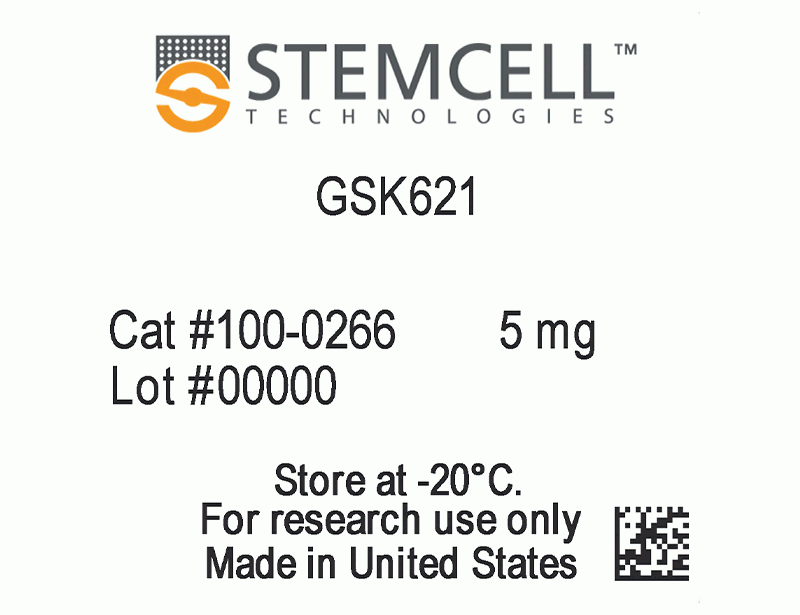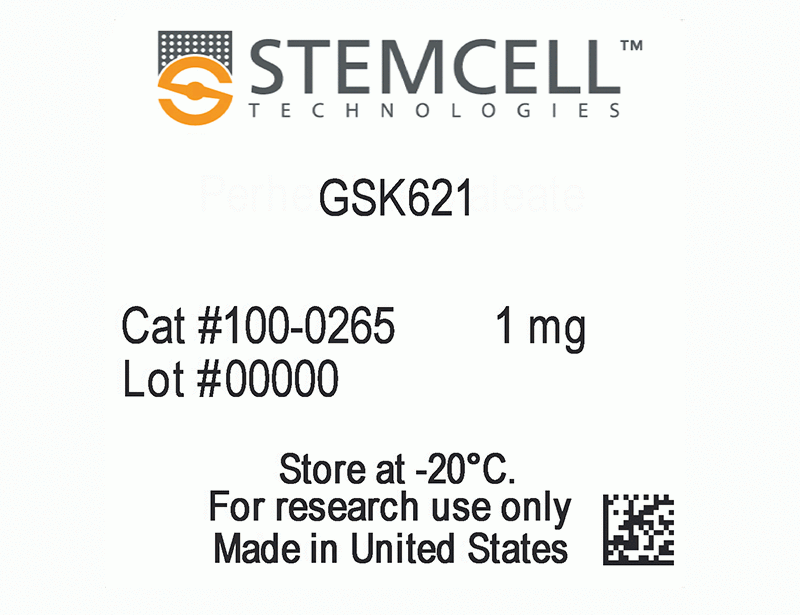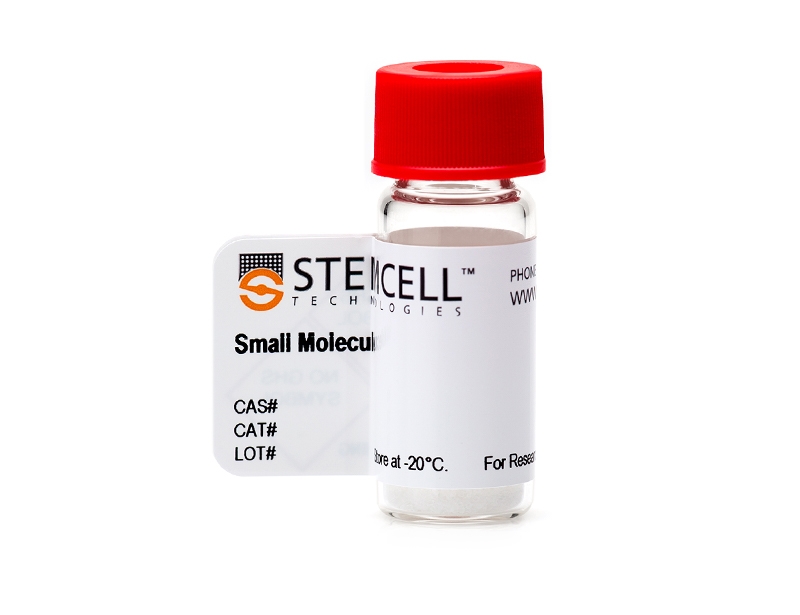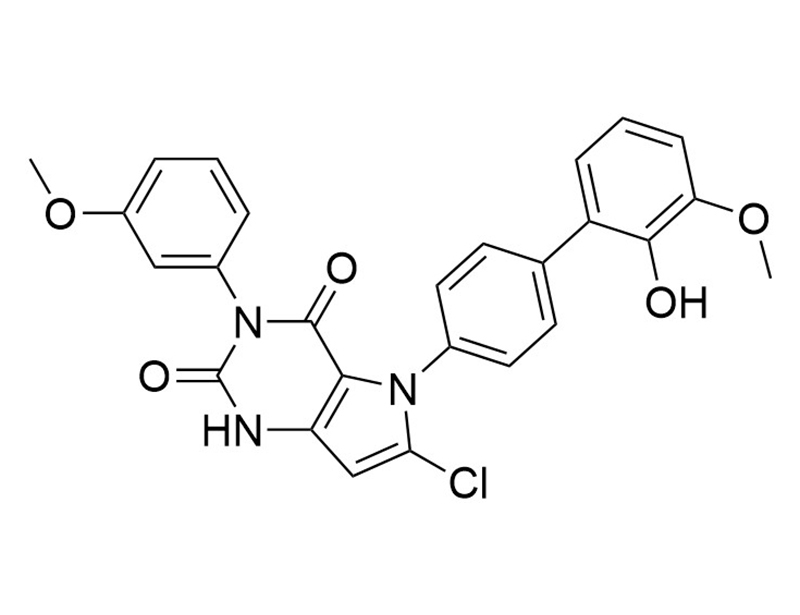GSK621
AMPK agonist
概要
GSK621 is a specific agonist of AMP-activated protein kinase (AMPK; Sujobert et al.)
CANCER RESEARCH
· Increases AMPKα T172 phosphorylation, a marker of AMPK activation, in acute myeloid leukemia (AML) cells and primary AML samples (Sujobert et al.).
· Displays selective cytotoxicity (IC₅₀ = 13 - 30 μM) by activating autophagy via the eIF2ɑ signaling pathway independent of mTORC1 activation in AML cell lines but not in normal hematopoietic progenitor cells (Sujobert et al.).
· Inhibits human melanoma cell survival and proliferation (Chen et al.).
CANCER RESEARCH
· Increases AMPKα T172 phosphorylation, a marker of AMPK activation, in acute myeloid leukemia (AML) cells and primary AML samples (Sujobert et al.).
· Displays selective cytotoxicity (IC₅₀ = 13 - 30 μM) by activating autophagy via the eIF2ɑ signaling pathway independent of mTORC1 activation in AML cell lines but not in normal hematopoietic progenitor cells (Sujobert et al.).
· Inhibits human melanoma cell survival and proliferation (Chen et al.).
Area of Interest
Autophagy, Cancer Research
CAS Number
1346607-05-3
Chemical Formula
C₂₆H₂₀ClN₃O₅
Molecular Weight
489.9 g/mol
Purity
≥ 98%
Pathway
AMPK
Target
AMPK
技术资料
| Document Type | 产品名称 | Catalog # | Lot # | 语言 |
|---|---|---|---|---|
| Product Information Sheet | GSK621 | 100-0265, 100-0266 | All | English |
| Safety Data Sheet | GSK621 | 100-0265, 100-0266 | All | English |
数据及文献
Publications (2)
Biochemical and biophysical research communications 2016 nov
AMPK activation by GSK621 inhibits human melanoma cells in vitro and in vivo.
Abstract
Abstract
Recent studies suggest that forced activation of AMP-activated protein kinase (AMPK) could inhibit melanoma cell proliferation. In this report, we evaluated the anti-melanoma cell activity by a novel small-molecular AMPK activator, GSK621. Treatment of GSK621 decreased survival and proliferation of human melanoma cells (A375, WM-115 and SK-Mel-2 lines), which was accompanied by activation of caspase-3/-9 and apoptosis. Reversely, caspase inhibitors attenuated GSK621-induced cytotoxicity against melanoma cells. Significantly, GSK621 was more potent than other AMPK activators (A769662, Compound 13 and AICAR) in inhibiting melanoma cells. Intriguingly, same GSK621 treatment was non-cytotoxic or pro-apoptotic against human melanocytes. Molecularly, we showed that activation of AMPK mediated GSK621's activity against melanoma cells. AMPK$\alpha$1 shRNA knockdown or dominant negative mutation (T172A) dramatically attenuated GSK621-induced melanoma cell lethality. Further studies revealed that MEK-ERK activation might be the primary resistance factor of GSK621. MEK-ERK inhibition, either genetically or pharmacologically, significantly sensitized melanoma cells to GSK-621. Remarkably, intraperitoneal (i.p.) injection of GSK621 inhibited A375 tumor growth in SCID mice. Co-administration of MEK-ERK inhibitor MEK162 further sensitized GSK621-induced anti-A375 tumor activity in vivo. Together, the results imply that targeted activation of AMPK by GSK621 inhibits melanoma cell survival and proliferation. MEK-ERK inhibition may further sensitize GSK621's anti-melanoma cell activity in vitro and in vivo.
Cell reports 2015 jun
Co-activation of AMPK and mTORC1 Induces Cytotoxicity in Acute Myeloid Leukemia.
Abstract
Abstract
AMPK is a master regulator of cellular metabolism that exerts either oncogenic or tumor suppressor activity depending on context. Here, we report that the specific AMPK agonist GSK621 selectively kills acute myeloid leukemia (AML) cells but spares normal hematopoietic progenitors. This differential sensitivity results from a unique synthetic lethal interaction involving concurrent activation of AMPK and mTORC1. Strikingly, the lethality of GSK621 in primary AML cells and AML cell lines is abrogated by chemical or genetic ablation of mTORC1 signaling. The same synthetic lethality between AMPK and mTORC1 activation is established in CD34-positive hematopoietic progenitors by constitutive activation of AKT or enhanced in AML cells by deletion of TSC2. Finally, cytotoxicity in AML cells from GSK621 involves the eIF2$\alpha$/ATF4 signaling pathway that specifically results from mTORC1 activation. AMPK activation may represent a therapeutic opportunity in mTORC1-overactivated cancers.




